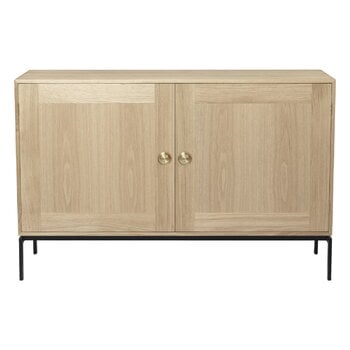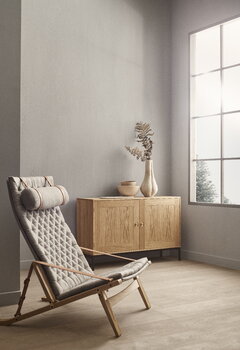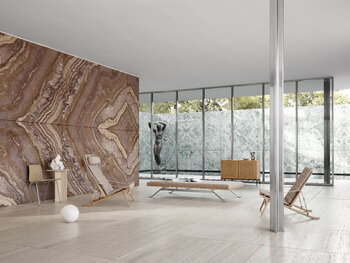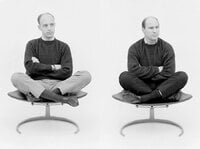The FK63 cabinet by Carl Hansen & Søn is an elegant and timeless storage piece where Scandinavian functionality meets masterful craftsmanship. Designed in 1963 by Danish architect duo Kastholm & Fabricius, the FK63 storage system embodies their modern and long-lasting design at its purest. With its minimalist aesthetics, high-quality materials and carefully considered details, the floor standing FK63 sideboard stands as a long-lasting classic that is suitable for both private homes and public spaces.
FK63 cabinet, floor standing, white oiled oak
Carl Hansen & Søn
Description
The FK63 cabinet by Carl Hansen & Søn is an elegant and timeless storage piece where Scandinavian functionality meets masterful craftsmanship. Designed in 1963 by Danish architect duo Kastholm & Fabricius, the FK63 storage system embodies their modern and long-lasting design at its purest. With its minimalist aesthetics, high-quality materials and carefully considered details, the floor standing FK63 sideboard stands as a long-lasting classic that is suitable for both private homes and public spaces.
Product details (7)
- Colour
- White oiled oak, black
- Width
- 112 cm
- Depth
- 36 cm
- Height
- 72.5 cm
- Leg height
- 9 cm
- Material
- Oiled oak. Handles and hinges: brass
- Base material
- Powder coated steel
- Product ID
Designer
Jørgen Kastholm (1931–2007) and Preben Juhl Fabricius (1931–1984) were Danish architects that collaborated from 1961 onwards. Kastholm, a blacksmith, and Fabricius, a cabinet maker, often managed to make the best of their differing backgrounds in their works. Although the collaboration only lasted about ten years and the pair only designed a handful of items, many of them have been chosen to museums as prime examples of Danish modernism.
View all productsReviews (0)
Sustainability
The Product Sustainability Framework, our criteria of sustainable design, helps you find the most sustainable products in our selection. Read below which sustainability criteria this product has met.
Working conditions & labour 8/9
-
Equal opportunities for all employees
-
Commitment to UN Global Compact, fair compensation for all employees
-
Corporate responsibility requirements defined and communicated for suppliers
-
Systematic work for improved inclusion and well-being in the workplace
-
Transparent supply chain
-
Suppliers' compliance to a code of conduct ensured
-
Compliance to the UN Guiding Principles on Business and Human Rights ensured in the supply chain
-
Support for community involvement in the supply chain
Eco-friendly production 6/9
-
Fair and resource-wise water-use in production
-
No incineration or landfilling of returned items
-
No use of endangered species as materials
-
No direct environmental emissions or waste (excl. GHGs) from production
-
Material-efficient and ecological packaging
-
No potentially harmful chemicals used in own production
Climate impact 6/8
-
Company's direct greenhouse gas emissions identified and commitment to reduction
-
Product's carbon impact identified and commitment to reduction
-
Guidance on energy- and eco-efficient use of the product
-
Contribution to climate initiatives beyond the brand’s direct operations
-
Low-carbon or compensated transportation
-
100 % renewable energy in own production and operations
Sustainable materials 6/6
-
Sustainable and long-lasting material choices
-
No harmful or hazardous substances
-
Responsible raw material sourcing and production
-
Materials suited for circularity: monomaterials, recyclable finishings, renewable or recycled contents etc.
-
Ecological materials: natural, biodegradable, recyclable or recycled contents
-
Outstanding materials in terms of innovativeness, responsibility, sustainability and circularity: local production or sourcing, 100 % recycled content, C2C-certification etc.
Circular design 4/5
-
High aesthetic quality promoting long-term use of the product
-
Technically durable product design and material choices
-
Design for enduring life-long quality
-
Design and support for product maintenance, repair and upgradability










